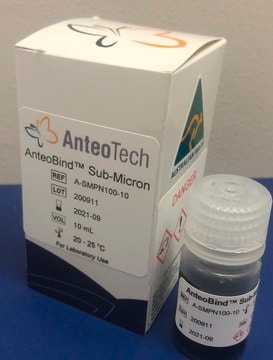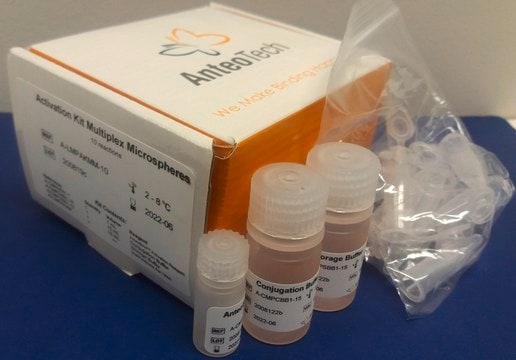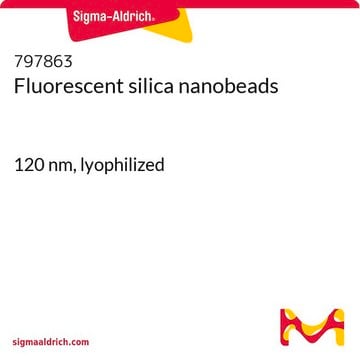A-PLSC010
AnteoBind™ Biosensor
Se connecterpour consulter vos tarifs contractuels et ceux de votre entreprise/organisme
About This Item
Code UNSPSC :
12352200
Nomenclature NACRES :
NA.22
Produits recommandés
Forme
liquid
Disponibilité
not available in Japan
Catégories apparentées
Description générale
AnteoBind Biosensor is a ready-to-use activation reagent specifically developed for binding biomolecules onto planar surfaces including polystyrenes, certain cyclic olefin copolymers, microarray slides, silicon oxides, titanium oxides, ceramics and gold surfaces (excluding gold colloids in suspension).
AnteoBind Biosensor can modify the strength of binding, wettability and surface charge of base materials commonly used in biosensor applications. By using AnteoBind surface coatings, it is possible to control protein binding and improve the stability of bound biomolecules across a range of surfaces used in biosensors.
AnteoBind Biosensor has many advantages over methods such as EDC. AnteoBind is water based and replaces the dry chemicals you would use with the EDC method. Using AnteoBind instead of NHS/EDC chemistry can save up to 3-4 hours of lab time. Experiments have shown increased stability and functionality for antibodies and a decreased background. AnteoBind improves reproducibility between experiments by providing uniformity between surfaces.
AnteoBind Biosensor can modify the strength of binding, wettability and surface charge of base materials commonly used in biosensor applications. By using AnteoBind surface coatings, it is possible to control protein binding and improve the stability of bound biomolecules across a range of surfaces used in biosensors.
AnteoBind Biosensor has many advantages over methods such as EDC. AnteoBind is water based and replaces the dry chemicals you would use with the EDC method. Using AnteoBind instead of NHS/EDC chemistry can save up to 3-4 hours of lab time. Experiments have shown increased stability and functionality for antibodies and a decreased background. AnteoBind improves reproducibility between experiments by providing uniformity between surfaces.
Application
Activation and coupling of biosensor planar surfaces
Caractéristiques et avantages
- Water based, activation and coupling reagent for biosensor planar surfaces
- Modify the strength of binding, wettability and surface charge of base materials
- An alternative to traditional chemistries such as NHS/EDC methods with an easier to use protocol
- Reduce reagent preparation time by 3-4 hours
- Increase antibody functionality
- Low background noise
- High reproducibility between experiments
Informations légales
Anteobind is a trademark of AnteoTech Ltd
Code de la classe de stockage
12 - Non Combustible Liquids
Classe de danger pour l'eau (WGK)
WGK 3
Point d'éclair (°F)
Not applicable
Point d'éclair (°C)
Not applicable
Faites votre choix parmi les versions les plus récentes :
Certificats d'analyse (COA)
Lot/Batch Number
Désolés, nous n'avons pas de COA pour ce produit disponible en ligne pour le moment.
Si vous avez besoin d'assistance, veuillez contacter Service Clients
Déjà en possession de ce produit ?
Retrouvez la documentation relative aux produits que vous avez récemment achetés dans la Bibliothèque de documents.
Jiao Wu et al.
Advanced functional materials, 26(22), 4016-4025 (2016-08-16)
We for the first time demonstrate multi-functional magnetic particles based rare cell isolation combined with the downstream laser desorption/ionization mass spectrometry (LDI-MS) to measure the metabolism of enriched circulating tumor cells (CTCs). The characterization of CTCs metabolism plays a significant
Marco Lindner et al.
Frontiers in chemistry, 6, 655-655 (2019-02-09)
Protein micropatterning has become an important tool for many biomedical applications as well as in academic research. Current techniques that allow to reduce the feature size of patterns below 1 μm are, however, often costly and require sophisticated equipment. We
Notre équipe de scientifiques dispose d'une expérience dans tous les secteurs de la recherche, notamment en sciences de la vie, science des matériaux, synthèse chimique, chromatographie, analyse et dans de nombreux autres domaines..
Contacter notre Service technique







